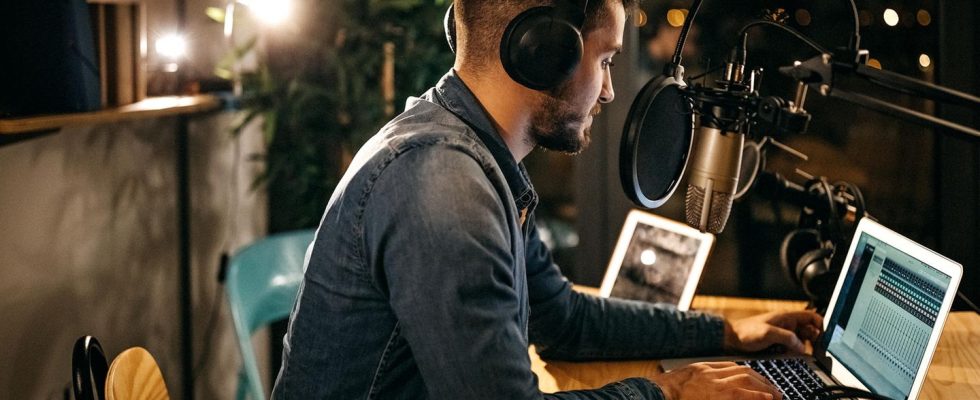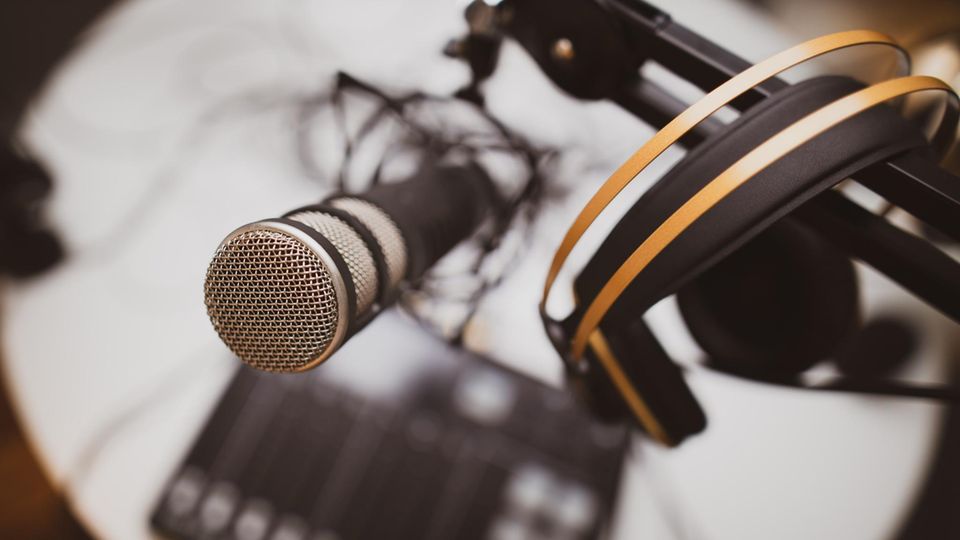Have a say
Creating a podcast: There is no recipe for success, but there is the right equipment
Creating a podcast: What equipment do you need for high-quality recordings?
© Getty Images
You don’t need a fully equipped recording studio to record a podcast. A good microphone and the right editing software are enough to start the project. Tips for getting started and the right accessories can be found here.
Podcasts are as different as the people who create them. The versatile medium is not rocket science and so very different formats make it into the charts of the most successful German podcasts. Everyone can participate, because the Internet offers the great advantage of being able to become active yourself. Are you thinking about recording your own podcast? There is certainly no guarantee of success, but at least you can get the right technical equipment. Read here which equipment is worthwhile for beginners and professionals.
Give yourself a voice
The great thing about podcasts is that everyone can participate. The recordings are uploaded quickly on the Internet and, at least in theory, have the opportunity to reach numerous people. It’s no wonder that many people ask themselves: “Could I record a podcast?” The question can be answered with a resounding yes. After all, everyone is entitled to try new projects. The most successful podcasts prove that you don’t always need a clear concept or level of popularity. However, it is not enough for two people to talk about this and that and that, because it depends on who is talking to each other and what topics the podcast covers. Not every podcast reaches a wide audience. But does he actually have to? You should ask yourself the following questions:
- What do you hope to achieve from your podcast?
- Who do you want to reach?
- What do you want to talk about?
- Do you want to act spontaneously or with a concept?
- How much time and work are you able and willing to put into the podcast?
It is clear that the regular appearance of the podcast is important. This allows potential listeners to get used to the format and know that they will continually hear new material. Perseverance can pay off and give you a loyal audience (in the long term).
If you want to make professional recordings, you need a microphone, mixer and headphones
© Unsplash
Technical equipment for your podcast
Depending on how much budget you have available or how professionally you want to approach the project, you can choose between high-end products and entry-level equipment. The price differences are clear and worth careful consideration.
1. Recording
The first step in the production chain of your podcast is recording. You will need either a microphone or a recording device.
Professional equipment
For a clean recording without noise and reverb, you should use a external microphone use. Compact Recording devices are also a possibility. You speak your podcast into the device and then connect it to the computer to transfer the file via memory card or cable. There is a small one along the way Lapel microphone (also lavalier microphone). As a speaker, it is also recommended to wear headphones so that you can hear yourself properly and make much better recordings.
The mixing console is popular and well-known Rode Caster Pro. However, its price is high because it is a high-end product. You can easily incorporate sound effects and melodies into your recording using programmable effects pedals. Thanks to the intuitive operation, even beginners can easily record with the Caster Pro. In addition, products in this segment do not constantly overtake each other, which means that with the Røde Caster Pro you have timeless and high-quality hardware.
Equipment for beginners
Alternatively, you can use the recording program on your smartphone. The quality is convincing for new phones and is sufficient for starters. Especially if you want to approach the podcast topic slowly, you can use your smartphone to create initial test recordings – without having to dig deep into your pockets for expensive equipment that might end up unused in the corner. To improve the sound quality you can use a small Lapel microphone use. This means you can take good photos with your smartphone and microphone.
2. Editing
Good editing software is available for free or for little money. Although the number of sound effects is limited, freeware is sufficient to get you started.
Professional equipment
Adobe Audition provides you with advanced post-editing and audio creation capabilities. However, the software is subject to a charge and is only recommended if you are already familiar with it and place particular value on quality and more complex editing. As a rule, freeware is sufficient to edit podcasts.
Software for beginners
Programs like Audacity or Cooledit, for example, are available to download for free. The freeware Audacity in particular is considered to be an easy-to-use and most frequently used audio editing program.
3. Publication
When it comes to publishing your podcast, there is no distinction between professional and amateur. Uploading to different platforms varies in complexity and time, but with a little skill anyone can upload podcasts to Spotify, Deezer or Soundcloud. In addition, (for starters) social media such as YouTube are ideal for uploading, as it is also free to use and listeners have the opportunity to share, comment or like content quickly and easily. Also add short descriptions (so-called show notes) to the podcast episodes. This way you can make potential listeners curious about your podcast.
The German podcast scene is booming
New formats see the light of day almost every day. These include flagships like “Fest und Fluschig” and “Gemischtes Hack”, but also lesser-known podcasts from newcomers to the scene who are trying their hand at the microphone. Which podcast becomes successful seems to depend on the zeitgeist and target group. In recent years in particular, people outside the public have taken the opportunity to start podcasts, such as Laura and Ariana from the “Herrengedeck” podcast. The two (former) radio presenters recorded entertaining conversations together and have repeatedly occupied top positions in the podcast charts in recent years without having been really known before.
But it’s not just podcast duos who are launching new podcasts. Media companies already have a lot of expertise and resources when it comes to creating audiovisual content and are also bringing formats onto the market. Whether news, true crime, entertainment or special interest topics, the range seems endless.
Streaming providers like Spotify are also increasingly securing exclusive podcast titles and developing new formats. German celebrities, like Palina Rojinski, now have their own podcasts and are cooperating with the Swedish streaming giant on production. There will certainly be further innovations in the podcast scene in the next few years. Zeitgeist and timing play crucial roles; the closer the podcasts are to the target group, the more loyal the listener is.
Note: The article was first published in February 2020.
You might also be interested in:
This article contains so-called affiliate links. Further information are available here.


